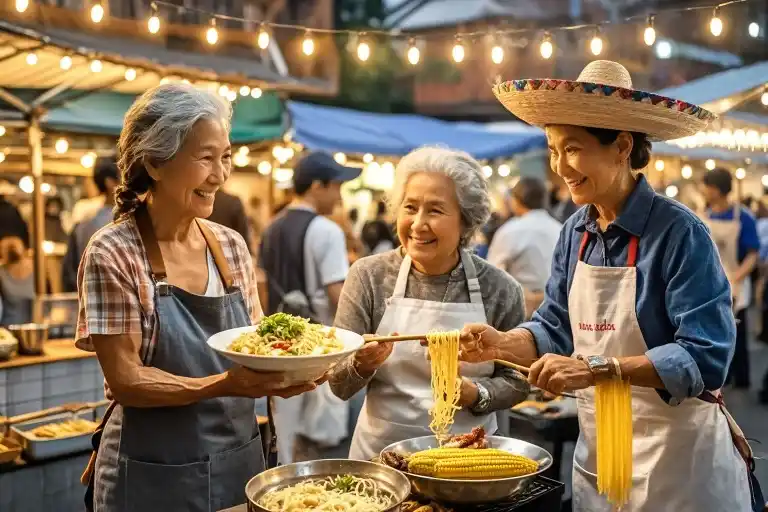The scent hits you first — woodsmoke curling from a roadside stall in Oaxaca, mingling with the tang of lime and charred chilies. Then comes the sound: the sizzle of meat hitting a griddle in a Bangkok alleyway, punctuated by laughter in a language you don’t speak. Finally, the touch: flour-dusted hands guiding yours to knead dough in a Tuscan farmhouse, the wrinkles around Nonna’s eyes deepening as she chuckles at your clumsy technique.
I spent over a decade chasing these moments — as a chef dissecting global cuisines, a travel blogger documenting hidden food markets, and a storyteller lecturing cruise passengers about culinary traditions. Yet the revelation that rewired my understanding of travel didn’t come from a Michelin-starred kitchen or a perfectly plated dish. It arrived in a Cambodian backyard, where a grandmother taught me to roll rice noodles while her grandchildren giggled at my first lumpy attempts.
When Flour and Water Become Trust
“Food is the only language everyone speaks,” a Mexican cocinera once told me as we chopped onions for mole sauce. I’d entered her family’s Puebla kitchen as a student of recipes; I left as a student of connection.
The Ritual of Imperfection
In Siena’s medieval quarter, 83-year-old Clara let me ruin three batches of pici pasta before intervening. “Bambina,” she clucked, reshaping my dough with hands that had survived war and famine, “the flour remembers your fear.” Her lesson wasn’t about achieving perfect thickness, but about surrendering to the meditative act of creation. By the time we sat down to eat those hand-rolled noodles with wild boar ragù, I’d learned more about Tuscan resilience than any museum could teach.
The Grammar of Street Food
Night markets taught me fluency in the unspoken:
- How Cambodian lort char vendors adjust spice levels for foreign tongues
- Why Thai grandmothers press extra mango sticky rice into your hands
- The way Sicilian arancini sellers wink when giving you “the good one” with molten cheese center
These weren’t transactions, but conversations — a silent “I see you” exchanged through taste buds.
Three Bowls That Changed My Compass
1. The Family Meal Rebellion (Mexico City)
In a sleek restaurant’s back kitchen, the staff’s family meal became my masterclass. Dishwasher María smuggled me her jalapeño-lime crema recipe — “the real Mexican fire” she claimed chefs diluted for tourist palates. As we mopped up sauce with tortillas, the hierarchy between chef and dishwasher dissolved like sugar in café de olla.
2. The Noodle Epiphany (Battambang)
Under a corrugated tin roof, Cambodian matriarch Srey taught me noodles aren’t measured in grams but in stories. Each fold of rice paste carried tales of monsoon harvests and ancestral weddings. When I finally produced a passable strand, she pressed a coconut sticky rice bundle into my hand — the same treat she gave her grandchildren on first school days.
3. The Espresso Truce (Naples)
My coffee-fueled feud with barista Enzo lasted three days. He refused to serve cappuccino after 11 AM; I insisted it’s my vacation. On the fourth morning, he slid me an espresso with a growled “when in Rome” — then sat down to explain Italy’s sacred coffee liturgy over shared biscotti.
Cooking Classes vs. Connection Classes
Forget Instagrammable chef’s tables. The magic happens when you:
🫓 Trade skills, not currency: Show a Moroccan baker your grandmother’s biscuit technique; they’ll reciprocate with saffron secrets
🍅 Embrace the “ugly” kitchen: The best taco isn’t at the trendy spot, but where abuelas fry masa in garages
🌶 Speak fluent appetite: A contented sigh after biting Sichuan hotpot speaks louder than perfect chopstick technique
Your Invitation to the World’s Kitchen Table
The next time you travel:
- Follow the laughter, not the influencers — communal joy orbits around food
- Ask “what’s your favorite” instead of “what’s famous” — you’ll get handed ancestral recipes
- Offer your hands, not just your camera — peeling garlic builds more bridges than perfect photos
As the setting sun paints Bangkok’s canals gold, I’m reminded of street vendor Auntie Linh’s wisdom while she taught me pho broth secrets: “We don’t feed strangers — we adopt temporary family.”
The world’s true flavor? It’s not in the first bite, but in the hand that offers the second.




